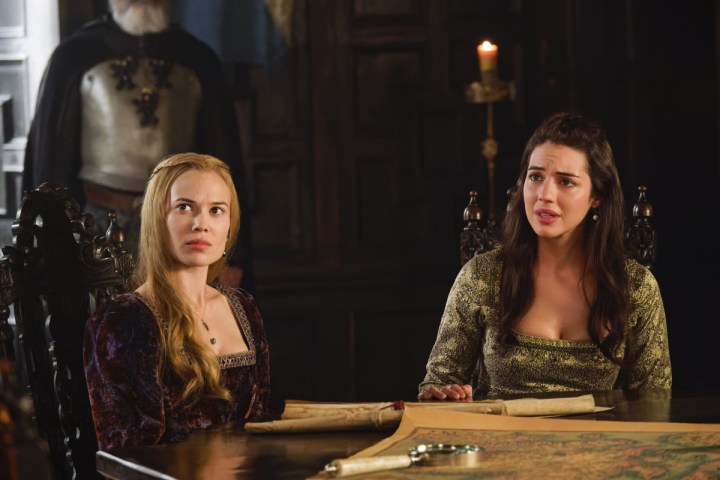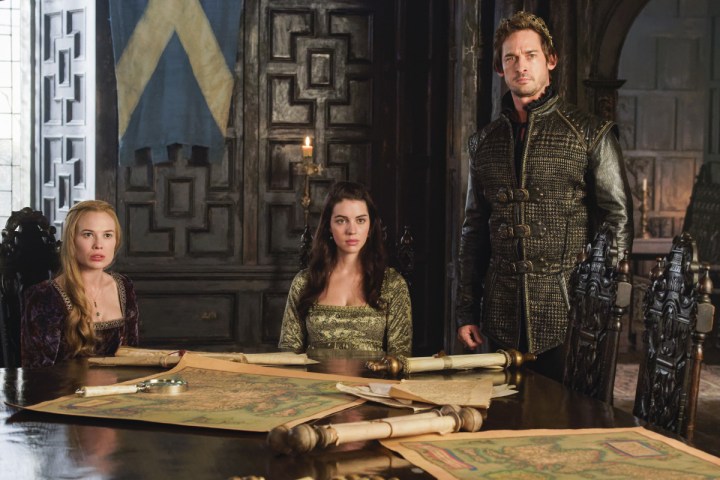
This week, on the penultimate Reign, our heroine finally levels up from unhappy wife to exhausted-but-exhilerated single mother. This permanent change to her role in the world involves a traumatic and gruesome childbirth, which she — as in history — survives more or less miraculously, along with her son, named James. Rather than a good long sleep and some high-quality pain medication, she almost immediately finds that much of her royal power taken from her (in the most underhanded of ways) and forces her to stagger into a War Room, still pale from blood loss, to fight for her own throne. Like everything Reign, it’s something slightly more heightened than melodrama that also manages to sting with reality.
Mary has long both wanted and required a child. Early in her tragic first marriage, she miscarried a child, and her inability to conceive with Francis (Toby Regbo) was a constant source of anxiety for them both. On top of the societal expectations, still around today (see: how Facebook ads instantly change to diapers and IVF after someone changes their status to married), for a royal, birthing an heir was more or less her entire job. This is why her first wedding night was observed by a room full of witnesses, so as to validate the paternity of any impending children, and why Darnley’s (Will Kemp) on and off threats to insinuate their child isn’t his have such a sting: she needs to have a child, and that child’s ancestry must be unmistakable. This is why ladies maids routinely checked for menstruation on sheets, this is why Catherine de’Medici (Megan Follows) famously went to her husband’s mistress for tips on how to be a better lover: royal pregnancies had the weight of the nation behind them.

Mary has lived to see three of her friends wind up pregnant out of wedlock, first Lola (Anna Popplewell), then Kenna (Caitlin Stasey), and finally Greer (Celina Sinden). Each announcement was met with a little more of a glazed-eyed look on Mary’s behalf, the failure she felt as a woman emanating through as these other young women — her mirrors, in so many ways — moved on to achieve, by accident, the one thing she most needed. It’s bittersweet that she finally birthed a child, her long-awaited heir, with an absentee husband she’s grown to actively detest, but the sense of peace she feels, standing on the balcony with her baby, is palpable. Yes, her reign may be in chaos yet again; yes, her husband is syphilitic and hallucinating his long-dead former lover; but dreams don’t always come true in the context we expect them to.
Mary’s gender has so often been taken by her enemies as a reason to disrespect and dismiss her. Earlier this season, she was criticized by one of Darnley’s friends for never birthing a French heir — she was seen as both Queen and breeding stock, and an infertile woman was of no use to anyone, particularly if the future of the country depended upon her. She is also, it’s easy to forget, always been isolated from her own family. Mary’s father died when she was six days old, and she grew up in a separate country from her mother. In France, she wound up with a surrogate family — joining the Valois clan, with Catherine as a stand-in mother figure. Once that was ripped from her, she worked to build a new life in Scotland, only to face challenges at every turn. Darnley (Will Kemp) may be little more to her than a sperm donor at this point, but her young son is hers, and along with the adoring Bothwell (Adam Croasdell), and following her near-death experience, she’s found that love and security have become her new priorities.

Mary’s arc through all four seasons of this show has been the constant battle between head and heart. She’s been a cutthroat, ruthless monarch when it’s required of her, but we’ve watched her build these muscles up from scratch. Her most innate personality traits, which emerge during times of stress, is characterized by a yearning for a simpler life of love and family. We saw this in season one when she ran off with Bash (Torrance Coombs), we saw this earlier this season when she nearly took off with Gideon (Ben Geurens), and even when she dreamed of marrying Darnley not in an ornate royal ceremony, but in a romantic forest, just the two of them. The tension between these two keeps her portrayal as riveting as it is, and sets her in contrast against the most single-minded Elizabeth (Rachel Skarsten) who, for a myriad of reasons, knows she cannot afford to waste a moment in longing for life that could never be hers.
This week, finding her erstwhile husband stricken with syphilis, Mary sends him to hospital for treatment. Darnley’s mother, Lady Lennox (Nola Augustson), as suspicious of Mary as Catherine was in early season one, interprets this as a power play on the Queen’s behalf. So Lennox manipulates her son to basically sign himself out, and arranges a shuffling of the Privy Council leaving Mary without a single ally. That she takes advantage of Mary’s treacherous childbirth to pull this coup makes it particularly distasteful. The same way that competitors in the Tour de France politely wait for their rivals to finish peeing before continuing on in the race, it feels somehow impolite for a woman, a mother herself, to use another woman’s excruciating childbirth as the time for a power play. And yet, this show has proven time and again that women are not to be underestimated — both as heroes, as well as villains. Last week may have gotten rid of the odious John Knox (Jonathan Goad), but Lennox’s determination to elevate her son is perhaps even more dangerous.

Which again returns to the thematic idea of motherhood. Lennox is as ambitious on her son’s behalf as Catherine (Megan Follows) is to any of her numerous children. The difference here is perhaps that Darnley is, seemingly, an only child, whereas Catherine — not one to be outdone in any arena of life — is a mother of nine. Catherine’s current predicament has to do with the way her children are feuding among themselves, leaving her to play favourites. Because birthing heirs to the throne is not a job that’s done once the babies are whisked off to their nursery, motherhood is a full-time job, even when one is also the Queen. Which is, one may suggest, why Elizabeth keeps edging herself ahead of her rivals, even if she doesn’t know it yet.
It’s no secret that Elizabeth I of England never married and never bore an heir, and it’s testament to this show’s visceral storytelling that we keep forgetting that bit. One episode ago, Elizabeth had a royal fiance and a secret peasant husband; now, weeks later, she’s alone again, but no less powerful. Although dealt a similar set of cards as her unlucky cousin, Elizabeth has managed to finagle loyalty out of a court filled with men who instinctively mistrust her. She’s also prone to fits of paranoia, merited given how many times she’s been almost assassinated, and offers a prickly ice queen front that seems to come more naturally to her than it does to Mary.

Mary and Elizabeth are so often discussed as a pair in a historical context, and it’s not just because of the way their paths finally end. There are a limitless number of ways to be a woman, but the routes that each of them wound up in are particularly striking to look at as a contrast. With Mary, we see the danger of following your heart; with Elizabeth, the prize for keeping aloof. Neither woman set on their respective courses knowing it would be the correct one. Anyone wagering on the relative success of either would likely have chosen Mary — a canny marriage and speedy delivery of an heir were generally enough to secure power for many royals before and after her. Elizabeth didn’t have the benefit of knowing the end to her own story, making her conscious choice to remain single all the more dangerous. Perhaps something in her cousin’s experiences influenced her — the way that, once a groom is chosen, a Queen must secede a measure of power and control to someone else. The mere existence of baby James now poses an additional threat to Elizabeth. Her advisors would surely be encouraging her to marry and bear her own child, lest James one day rise up to seize control of England.
In a centrepiece of this episode, and possibly the series, Mary writes her cousin a letter, appealing to her as a friend and an equal. These two have been rivals since before Skarsten was cast on the show, Elizabeth’s reign a shadow that slowly began to engulf Mary’s life. Real-life issues, compounded with the Reign-invented plot twists, have forced these women into a relentless game of thrones, each of them always aware that the other could be her undoing. Something in Mary’s new role as mother has perhaps put all of that into context for her; Elizabeth may be her rival, but at least she knows where she stands. Darnley changes his allegiance ten times an hour, and Mary knows by now that nobody (save Bothwell and Greer) in Scotland are working in her best interest. She does not plead so much as reason with Elizabeth, suggesting that, should Elizabeth die without bearing her own child, that she consider James as her successor.
What we know is that James’s birth is the final piece required for the Rube Goldberg sequence of coincidences and miscalculations and bad luck that comprise the end of this chapter of Mary’s life. History doesn’t mention Darnley, hallucinating due to syphilis and empowered by a court that value white men more than anyone else, absconded with his son moments after the birth. But this is Reign history, and of course that just happened. The agony of a kidnapped child is visceral for all of us, and combined with Mary having had a really bad day, is the perfect soap opera plot twist to lead us into next week’s series finale. It also highlights the double-edged sword that motherhood is for Mary — on one hand, providing her with a long-needed sense of security and fulfilment, while simultaneously putting her heart at more risk of breaking than ever before.

I’ve only gotten into these reviews midway through the season, but they have quickly become required post-episode reading. I will miss them as much as I do the show, when it all comes to an end next week. Thank you for sharing your thoughts.
Thanks so much!